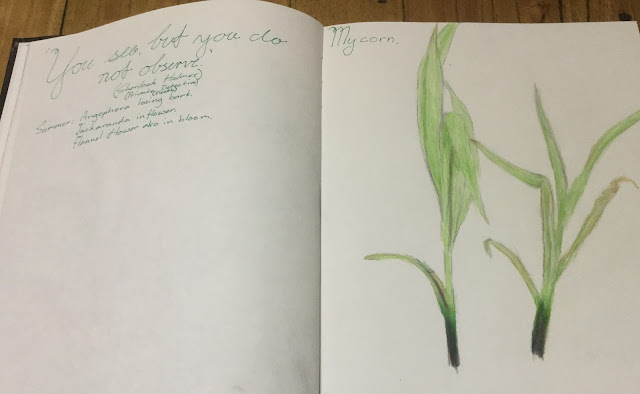'We too are under authority and there are limitations to parental authority.'
The limitations to the parental authority we exercise over our children in the area of moral training become more evident as our children mature. When our children are little we have broad overarching responsibilities which tend to obscure these limitations. As our children mature our parental authority is not so black and white anymore, and if I treat my 14 year old the same way I'd treat a 6 year old in how I wield my authority, he is not going to develop any moral muscle.
One of the biggest strains of parenting is adjusting our authority as our children mature and knowing how, when and where to extend or limit the boundaries we have in place.
Morals don't come by nature:
'An educated conscience is a far rare possession than we imagine.'
A sobering thought!
'An educated conscience comes only by teaching with authority and adorning by example.'
Our authority needs to be paired with example. I can't hide behind my authority for very long. They'll spot hypocrisy or double standards a mile away.
I haven't tried to come up with 'lessons' for transmitting moral training or even done much in the way of pre-planning times for this, but something I've purposely tried to do is to live in a devotional context. Every day I have opportunities for devotional living and moral training. Reading quality literature and discussing the various characters and their actions is a way to develop an educated concience. So is taking the common little incidents of daily life and using them as tools for both our children and ourselves. Often these incidents seem like interruptions but I've realised that part of my own moral training has been to see these things as God might see them and ask, "Lord, what can I learn from this?" and "What can I teach my children in this situation?"
God's Word, poetry, biography and the use of mottoes are some suggestions Charlotte Mason gives to help us in the moral training of our children.
Mottoes
I grew up with one or both of my Grannies in the home for many years and both of them used many little sayings or proverbs that were in common use in their day. I now rarely hear anyone quote mottoes or proverbs in everyday speech.
It's a similar situation with
Folksongs - they've almost died out in general society; mottoes even more so, and if we are to keep them alive we need to make a conscious effort to use them.
A stitch in time saves nine.
Good, better, best, never let it rest, until your good is better and your better best.
Do the next right thing.
Leave it better than you found it.
Even a child is known by his actions by whether his conduct is pure and right.
A soft answer turns away anger.
Is it true, is it kind, did I really have to say it?
Let another praise you and not your own mouth, someone else and not your own lips.
Treat others the way you'd like to be treated.
Honour one another above yourselves.
Don't put off until tomorrow what you can do today.
Civility costs nothing.
Practice makes perfect.
Tomorrow, tomorrow, not today - that's what lazy people say!
Make hay while the sun shines.
Laughter is the best medicine.
The grass is always greener on the other side.
Good things come in small packages.
Measure twice, cut once.
Slow and steady wins the race.
Pretty is as pretty does.
The biographies of famous Greeks and Romans by Plutarch and the reading of poetry have opened doors for moral instruction in our home. I might read a poem aloud and something will resonate with me so I'll share it with our children. Sometimes I'll give some background information on the poet or the poem and why it was written and we'll talk about that. Or we'll be having our Plutarch reading and we'll get into a discussion over one of the questions in the
study notes.
When I use my own experience and am honest about my weaknesses and flaws it has helped my children deal with their own. I tend to have a quick temper and have had to learn some hard lessons about keeping myself in check. I have two children who have a similar disposition, although one of them has had a harder time dealing with it than the other. He knows I've had a similar struggle and I've had some good opportunities to educate his conscience in his teachable moments ie. not when he's in a passion!
I took some words to heart as a young Christian from something Edith Schaeffer wrote which was along the lines of, "In your anger, don't say something hurtful that you would never say if you were under control," and have impressed that on him.
Bible
Besides using the Proverbs, memorising scripture is an obvious way to train moral character.
'I have hidden Your Word in my heart that I might not sin against You.' Psalm 119
The accounts of men and women in the Bible, the good, the bad, the faithful and the unfaithful are there for our benefit but,
'In the matter of the ideas that inspire the virtuous life, we miss much by our way of taking things for granted.'
We know the story of Noah inside out and because of this familiarity we sometimes miss things but the other week we heard a sermon on love - 'Love Covers.' The speaker talked about Noah preaching for 120 years, building an ark before it had ever rained on the earth and the ridicule he received while he did it. After all his efforts only eight people were saved. After the deluge, Noah planted a vineyard and then he got drunk. He wasn't a wicked man. Perhaps he was discouraged. It was a moment of weakness. Later one of his sons came along, saw him drunk and naked, and called his two brothers to witness their father's condition. His brothers came but the two of them took a garment and placing it over their shoulders, walked in backwards so they didn't see their father's nakedness and covered him up. Their love covered their father's weakness. How easy it is to broadcast another's weakness as the younger son had done. This message was so powerfully conveyed that we won't be forgetting it, but we'd passed over it when we'd read it in Genesis the week before.
A mistake I made in the early days of mothering was placing too much emphasis on the outward appearance of virtue. Issues of the heart often go unchecked when we do this. I read this in Whatever Happened to Worship by A.W. Tozer:
'Benjamin Franklin...a deist and not a Christian...kept a daily graph on a series of little square charts which represented such virtues as honesty, faithfulness, charity and probably a dozen others. He worked these into a kind of calendar and when he had violated one of the virtues he would write it down. When he had gone for a day or a month without having broken any of his self-imposed commandments, he considered that he was doing pretty well as a human being.
A sense of ethics? Yes.
Any sense of the divine? No.'
In all of my thoughts and intentions regarding moral training, I want to inspire the children God has entrusted me with to godliness, and not just give them ethics.
"Lord, help me to see the things I need to see today in my children and give me the wisdom to reach their hearts in those areas."




































